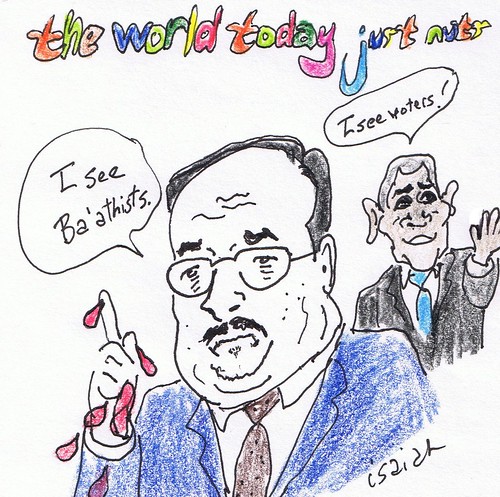Business and investment wise, money and business keeps going to the north. ExxonMobil is already going with the Kurdistan region and Reuters noted, "Total’s chief executive said on Friday he was considering possible investments in Kurdistan, something which previously prompted the central Iraq government to bar companies from investing in the south of the country, and added he did not plan to chase contracts in Baghdad’s next licensing round." Tara Patel (Bloomberg News) notes the company is "Europe's third-largest oil company" and that the three provinces which make up the Kurdistan Regional Government are "home to about 40% of the country's 115 billion barrels of reserves". Carin Hall (Energy Digital) explains, "Iraq opened up its vast reserves of oil to foreign investment after the Gulf War, but many find Baghdad's terms too stringent."
Nouri will no doubt see much more business go to the KRG. Unlike Baghdad, the KRG is not forever in gridlock and leaders aren't always trying to imprison rival politicians. The government there makes public efforts at transparency. Last week, the KRG noted their attendance at an anti-corruption conference in Abu Dhabi:
A delegation from the Kurdistan Regional Government participated in the 3rd Middle East Summit on Anti-Corruption. The conference was a platform for senior-level executives in both public and private sectors to discuss strategies for minimizing bribery risks in the Middle East and implementing an effective and risk-based global compliance program.
Ms Nisar Talabany, Senior Adviser to Prime Minister Barham Salih, described the Kurdistan Regional Government's (KRG) Anti-Corruption efforts and gave an overview of the KRG's reform initiatives to minimise bribery risks in public-private partnerships. She said, "We assured the senior executives who are working to combat this grave issue that the KRG is part of the global movement against corruption, and our leaders are firmly committed to this fight".
In 2009, the KRG engaged PriceWaterhouseCoopers (PWC) to evaluate government procedures and devise a good governance and transparency strategy.
But that's the KRG, not Nouri's Iraq. Nouri's Iraq executes people. So does the US (so does the KRG), so does many countries. But none with the zeal of Nouri's Iraq. Last week saw the total number of prisoners executed since the start of this year rise to at least 65. Human Rights Watch noted their concern "that Iraqi courts admit as evidence confessions obtained under coercion. The government should disclose the identities, locations, and status of all prisoners on death row, the crimes for which they have been convicted, court records for their being charged, tried, and sentenced, and details of any impending executions" and the organization's Middle East director Joe Stork stated, "The government needs to declare an immediate moratorium on all executions and begin an overhaul of its flawed criminal justice system."
Proof that Nouri and his appointees just don't get it came quickly was Ministry of Human Rights spokesperson declaring on TV that (a) the death penalty deters crimes (that has never been established as fact despite centuries of proponets of capital punishment insisting it deters crime) and (b) Iraq began executions in 2004 and they moved more slowly but these days the process is very quick. He also vaugely appeared to indicate that Human Rights Watch's number was wrong (they say "approximately") and that it was wrong because they were unaware of some of the executions that had taken place. The actual number, he indicated, of people put to death by the Iraqi government since the start of the year is more than 65.
Nouri's a thug. We know it. He knows it.


And it hasn't changed a thing in terms of the way he conducts himself. But as foreign companies invest and create jobs -- and as they attempt in the KRG and not Iraq proper -- Nouri may have to answer to the investment class and that might be the thing that finally rids Iraq of Little Saddam.
Corruption and violence is all Nouri al-Maliki has to offer -- to the world or to Iraqis. Al Mada reports that the Supreme Judicial Council sent a request to Parliament to remove immunity (all members of Parliament have legal immunity) from Iraqiya's Salim al-Mullah and the National Alliance's Sabah al-Saadi. That won't draw any business or help Nouri make friends either.
[Illustration is Isaiah's The World Today Just Nuts "I See Ba'athists" from December 25, 2011.=
